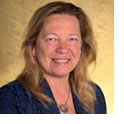
Leadership Interview: Ruth Johnston, Organizational Excellence
POD talked with UW Planning & Management's Associate Vice President and Chief of Staff, Ruth Johnston, who has played an integral role in the UW Organizational Excellence Program.
How does the work you're doing in Organizational Excellence (OE) differ from other organizational development (OD) work being done at the UW? Why might someone contact OE as opposed to, e.g., POD or RAPID?
OE was established by the president and provost as a strategic goal within the Two Years to Two Decades (2y2d) Initiative in September 2013 to provide assistance primarily to academic and academic support units wanting to improve the way they do their work. Our typical services are strategic planning, process improvement (using Lean and other methodology), organizational assessments (structure, finances, etc.), and leadership team development.
Although we offer occasional "capacity building" workshops for leadership and change agents, our focus is not on skill building as much as it is planning for the future and strategic thinking. POD does an excellent job with training, as well as with OD, for all types of organizations across the UW. RAPID's focus changed to support for research-related improvement when OE was formed and coordinates with OE when they are asked to get engaged with other work at UW.
As the UW takes on large change projects, e.g., HR/Payroll Modernization, Finance Modernization, and re-organizations like creating Planning & Management, we will need to talk collectively about how to best resource the support needed.
At what point during a project or process should someone contact you?
Earlier is better—but often we get called in after a problem has been identified. There's no single approach or course of action, but here are a few examples: A dean or department chair, in thinking about their future and their budget, may begin to wonder about strategic planning and how best to go about it. Most have done strategic planning, of course, but plans and objectives become out of date, new players are in place, or a desire arises to engage more faculty or staff. That's often when OE is called for help in facilitating the process, or for external consultants to do it (often, both internal and external resources are consulted, resulting in more diverse options). Another example might be the realization that some processes are not working well, as evidenced through an audit, financial issues, or the "pain" expressed by staff, faculty, or students. We are often called in to do organizational assessments or process reviews, or to facilitate improvements using Lean or other methods. Finally, since many leaders were not officially trained as leaders or managers, I receive a number of calls simply to talk about how to deal with something—people issues, leadership issues, team issues, etc.
Who is your typical client, or does that vary widely?
Most of our work is leadership driven, usually by deans or vice presidents/provosts. When OE first started, I met with each dean and vice chancellor and with most of the VPs. I continue to keep in touch with many of them or with their administrators, along with organizational change folks across campus.
In your partnerships with organizations and staff across the UW, have there been any big "aha" moments?
My favorite moments are when those engaged with the work realize: 1) focusing on improvement work is different than their regular work products and it can make a HUGE difference, 2) the value of collaborative work, especially with both faculty and staff together, 3) they want to sustain the changes and the new approaches to process improvement that they have learned, 4) it is possible to move from strategic planning to implementation and make a difference, and 5) that this work is being done all over the UW and they can learn from each other.
What have all of you in OE learned about the UW and about yourselves as a team?
Everyone is so helpful at UW, but people often don't know how to connect with each other or with pertinent information or resources; that's one thing we do and is one of our strengths—linking folks to each other.
Earlier this year, you hosted an Organizational Excellence Showcase. Do you anticipate offering an event like that again?
Yes! We hope to make this an annual event. The Showcase was very well-received by the poster presenters and the attendees, and many folks who attended now want to present their work.
To keep visible and stay connected, we also offer other events, such as quarterly OE Forums and learning sessions, along with biannual reports about UW-wide process improvement work and accomplishments. In addition, our website is always a great source for OE news, contacts, upcoming events, and tools.


